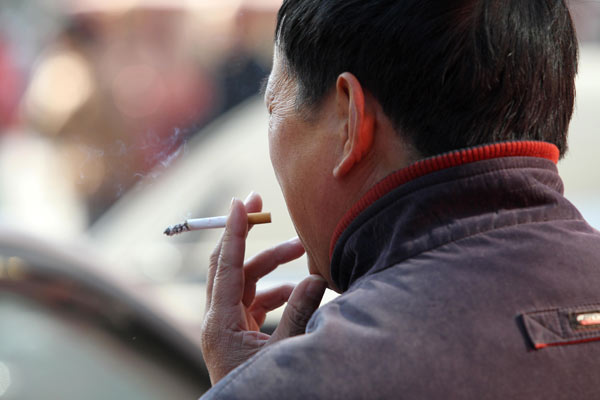New rules can save society from smokers
By Wang Yiqing (China Daily) Updated: 2015-06-01 07:50
 |
|
A man takes a cigarette break in a public place in Nantong, Jiangsu province, on Nov 30. Provided to China Daily |
Beijing is determined to make public places no-smoking zones after its new tobacco control regulations come into force on June 1. According to the new regulations, smoking has been banned in all indoor public places, workplaces and public vehicles. Smoking is also banned in outdoor public places such as kindergartens, primary and middle schools, heritage institutions, stadiums, maternal-and child-care institutions, and children's hospitals. More important, public organizations that fail to impose the ban will be fined up to 30,000 yuan ($4,839) and individual violators face a 200-yuan penalty.
The new regulations, by far the "strictest" until now, are compatible with the requirements of the World Health Organization Framework Convention on Tobacco Control.
Among WHO's six-point MPOWER tobacco control strategy (Monitoring tobacco use and issuing prevention policies, Protecting people from tobacco smoke, Offering help to quit tobacco use, Warning about the dangers of tobacco, Enforcing ban on tobacco advertising, Promotion and sponsorship, and Raising taxes on tobacco), making public spaces and workplaces no-smoking zones is the most feasible measure across the world.
The new regulations have been welcomed by the public, especially because of the rising trend of smoking in Beijing. According to Beijing Municipal Commission of Health and Family Planning, the smoking rate among males in the capital is as high as 43.2 percent; it is 2.4 percent among females. The city has about 4.19 million smokers, and about 10 million people are exposed to and endangered by second-hand smoking.
The new regulations have turned tobacco control into a public issue that demands public supervision with the involvement of the government, communities, social forces and individuals, making it easier to reach a social consensus on tobacco control.
Imposing a strict law to ban smoking will protect non-smokers against passive smoking and create a social environment that will put pressure on smokers to quit smoking. The public is happy that the new regulations focus more on public health and give special protection to women and children, most of whom are non-smokers and suffer the consequences of passive smoking.
Legislation is crucial in any anti-smoking campaign, because smoking has been part of social interaction for centuries in China, which many people have come to accept, if only reluctantly. Even non-smokers aware of the negative impact of passive smoking find it difficult to stop smokers from poisoning them given the prevalent social custom and China's unique "face" culture. A legal ban on smoking thus conveys to smokers the "non-tolerant" attitude of the authorities and the public toward smoking in public places. And this will help curb the spread of this unhealthy habit.
The new regulations stress on the legal responsibilities and obligations of public organizations in tobacco control. Several local organizations have issued no-smoking notices in public places, but the enforcement has been less than satisfactory, because they lack enough supervision mechanisms to enforce the ban and many business organizations are unwilling to offend smokers if they are clients or customers. Under the new regulations, however, the public has the right to report to the authorities the violation of the ban by individuals by dialing the 12320 hotline or sending a message through WeChat public account "smoking-free". The reported cases will be dealt with according to the law, including imposing fines on the violators.
But, like many other regulations in China, the ban on smoking too faces the problem of enforcement. Liu Zejun, director of Beijing Patriotic Public Health Campaign Committee, says Beijing has less than 1,000 law-enforcement personnel to impose the ban on more than 4 million smokers. Beijing International Airport closed all the 36 smoking rooms in the terminals on the 24th World No Tobacco Day on June 1, 2011. But some of the smoking rooms were reopened after six months because of "passengers' demand".
Still, the new regulations are a good beginning to create a smoking-free world, even though law enforcement will test the authorities' determination, responsibility and administrative ability. And we hope the new regulations will succeed where earlier ones failed despite the best intentions.
The author is a writer with China Daily. wangyiqing@chinadaily.com.cn

I’ve lived in China for quite a considerable time including my graduate school years, travelled and worked in a few cities and still choose my destination taking into consideration the density of smog or PM2.5 particulate matter in the region.











